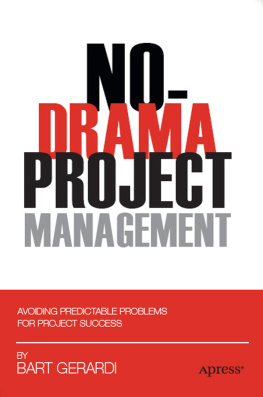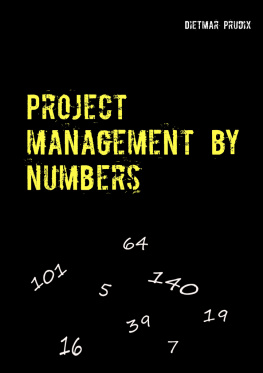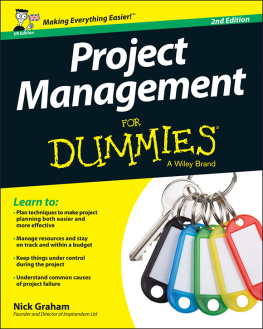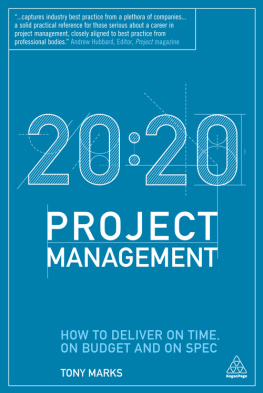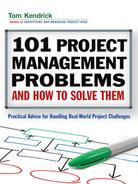You can find more of Bart's writings at www.NoDramaPM.com.
Acknowledgments
There are a lot of people who knowingly or unknowingly made this book possible. These include people who have taught me, people I have learned from, people who worked with me or for me, as well as the people who participated in the creation of the book itself. Without any one of these people, this book would never have existed, and for that I am eternally grateful.
The first group of people are those I've worked for, either in the past or the present. They include Brad Palmer, Adrian Griego, Neil Wheaton, Josh Koppelman, and Tim Martin. These are the folks who felt it was their job to teach me, sometimes accidentally, the practice of running projects. Without them, I wouldn't have had projects to run or experiences to share throughout this book.
The focus of this book is on how a program manager manages project managers. I have to thank my fabulous team for allowing me to manage them for the past several years and practice some of these concepts on them. My team has included Adam Garland, Caleb Munson, Charlene Bunting, Erin DeCesare, Kelli Connors, Matt Gittlitz, and Nicholas Smith, among others throughout the years. In particular, Adam was the one who made me write this book in the first place.
Part of the crux of No-Drama Project Management is working well with your clients. In order for this to work, you need clients who are willing to play along and willing to experiment with you. I've been fortunate to have great clients in Marion Thomas, James Connolly, Matt Guinen, Julia Voorhees, Alison French, Christine Midwood, and my client and thinking partner, Jennifer Hood, plus several score more.
The process of writing a book is a long one, and there are more people involved that you can imagine. This book wouldn't have seen print if not for my great editors, Jennifer Blackwell and Jeff Olson, and outstanding copy-editor Tiffany Taylor, and probably many more who I don't know about. What you hold in your hands is as much due to them as to me.
Finally, the people who gave the most to let me write this book are my family. My wonderful wife Judy, and my three kids, Emily, Brett, and Ben, didn't mind when I was writing during family vacations, and encouraged me by getting excited when the cover was complete (and sharing with their friends). They were key stakeholders in this entire project, a concept I discuss later in the book.
If any one of the people I've worked with, I've worked for, I've helped support, or who supported me had acted a little bit differently than they did, this book wouldn't exist. It's hard to put into words my thanks, other than to say, thanks for everything.
Preface
If you picked up this book, you are probably a project manager, program manager, or some other project professional. I can tell you, without knowing you personally, that some of your projects have failed. In fact, one might be in the process of failing right now. What you may not know is that not all failures are created equal. Some failures are actually good for your career, whereas some successes may not be. Why is this?
Drama.
Your team, clients, sponsors, and managers want you to be successful. They want every project to create a lot of value and be fondly remembered after it's finished. But this isn't always the case, and it's not always a bad thing. What they don't want is for your project to be full of anxiety and stress. And there is no better way to create stress than by failing in a way that other projects have failed. These include things like lack of preparation, lack of communication, or lack of understanding or alignment on what the project is supposed to deliver. The cause and result of any of these failures is the same:
Drama.
Drama is sand in the gears of any project.
This book explores the predictable ways that projects fail, and how you can work to avoid them. Nobody wants to be on a project that fails for an obvious reason or due to the actions or inactions of the project manager. Projects are inherently risky, and some of those risks are beyond your control. Having one of those risks sink your project isn't necessarily a big deal, nor does it have to a career buster. But to have an issue that looks to others (and yourself) like a failure of basic project-management skills ruin your delivery may also ruin your prospects of advancement. Fortunately, avoiding that fate is well within your control.
In the chapters that follow, I discuss the problems that doom projects over and over again, and how you can recognize and prevent them. The hope is that if your project is destined to fail, at least it will be for a reason you can be proud ofsomething you can tell fascinating stories about for years to come.

